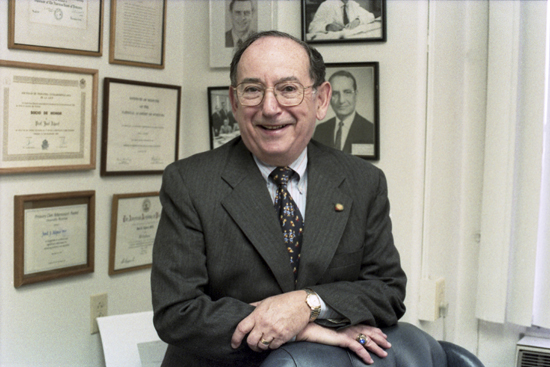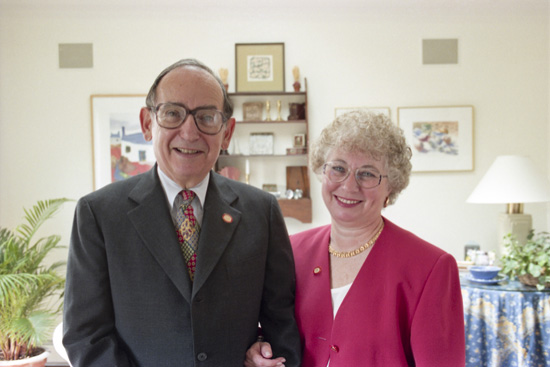MED’s Joel Alpert Dies at 83
Pediatrician remembered as strong advocate of primary care

Joel Alpert loved the Yale Bulldogs, believed men should wear ties, hated smoking, and relished a good debate. But among his many passions, he most ardently supported the provision of quality primary care to the children and families he served as the one-time chief of pediatrics at Boston Medical Center (BMC).
Arriving at BMC (then Boston City Hospital) in 1972, Alpert, a School of Medicine professor and chair emeritus of pediatrics, “came into a challenging situation and basically, at a time when everyone was moving to subspecialty care, put the limelight on primary care pediatrics,” says Robert Vinci, MED’s Joel and Barbara Alpert Professor of Pediatrics and department chair and chief of pediatrics at BMC. “He turned around this institution. He led with strength, with vision, and he became one of the national figures in academic pediatrics.”
Alpert, who was also a MED assistant dean for student affairs and a member of the Dean’s Advisory Board, died of leukemia on December 31, 2013, while in hospice care near his home in Palm Beach Gardens, Fla. He was 83.
During his four decades at MED and BMC, Alpert pioneered pediatric primary care training and the development of a curriculum that emphasized child development, advocacy, and community care. He held several leadership positions in major pediatric associations and earned numerous awards throughout his career. His writings, including The Education of Physicians for Primary Care in 1974, still define the practice today.
“Joel Alpert was a recognized leader in pediatric care and medical policy,” says Karen Antman, Medical Campus provost and MED dean. “He was an enormous influence on generations of medical students for whom he served as a role model and mentor and held himself, his department faculty, and students to the highest academic standards.”
Alpert was a vociferous advocate of universal health care long before it was politically in vogue. His position was likely rooted, colleagues say, in his Judaism, his focus on equity, and his experience serving as a doctor in London in 1958 and as an Army physician in Kansas in the early 1960s. He completed his residency at Boston Children’s Hospital and joined the Harvard faculty in 1961. A decade later, he arrived at BMC, MED’s primary teaching hospital, where patients largely come from the city’s underserved populations. In an American Academy of Pediatrics interview, he credited his mentor, Charles Alderson Janeway, then the physician in chief at Boston Children’s Hospital, for the advice that pushed him in that direction: “At Harvard, you will teach the people who teach,” Janeway told him. “At Boston University, you will teach the people who do.”
Alpert drilled the value of primary care and community-based pediatrics into the generations of doctors he trained. One of those doctors, Barry Zuckerman, the first Joel and Barbara Alpert Professor of Pediatrics, remembers how his mentor insisted that physicians show up at their clinics, continue to care for patients beyond their first appointments, and ensure that all patients’ needs were met—regardless of whether those needs were medical. “Back in 1972, that just wasn’t done,” says Zuckerman.
But he also recognized and nurtured the individual passions of his younger colleagues. As an intern in 1980, Vinci remembers Alpert encouraging his desire to start a branch of pediatric emergency medicine at BMC. Zuckerman says that Alpert supported him in setting up a division of developmental behavior pediatrics—one of the first in the country—despite Zuckerman’s being only one year out of his fellowship.
“He valued those things that I believed in,” Zuckerman says. Although they might not have been mainstream, “he cared about them and valued both me and my ideas.”

Alpert campaigned tirelessly around issues of lead poisoning and gun control—even proudly pointing to his position on the National Rifle Association’s enemies list, according to the Boston Globe. And he despised smoking. Zuckerman remembers a conference Alpert hosted at his home in the early 1970s at which he insisted that anyone who wanted to smoke—including the woman who had helped endow the event—step outside the house, despite the rain. “You can’t fully appreciate how obnoxious he was” about smoking, Zuckerman says.
“When Joel believed in something, he went after it, and there was nothing that was going to stop him,” Vinci says. “I learned from Joel that no matter how challenging the situation, you just didn’t back down. If this was the right thing to do, you went after it.
“He really believed that pediatricians should be advocates, that our voices should be heard,” Vinci adds. “And in doing so, that we should be and become the voices of the children and families we served.”
Alpert’s “numerous contributions in the field of pediatrics improved the lives of countless children and their families and will continue to do so for many years to come,” says Kate Walsh, BMC president and CEO.
Born and raised in New Haven, Conn., Alpert graduated from Yale University in 1952. He earned a degree from Harvard Medical School four years later, but remained loyal to his undergraduate alma mater. He attended more than 50 Harvard vs. Yale football games over the years and always rooted for the Bulldogs, Vinci says.
While at BU, Alpert served as president of the American Academy of Pediatrics and of the Academic Pediatric Association, formerly Ambulatory Pediatrics. He was also elected a member of the Institute of Medicine and named an honorary fellow of the Royal College of Paediatrics and Child Health in London.
In 2000, Alpert and his wife, Barbara, established the Joel and Barbara Alpert Professorship in Pediatrics, which is held by the department chair. That same year, the couple established the Children of the City Fund at BMC to support early career pediatric researchers who study issues affecting inner-city children served by the hospital.
Despite his many career accomplishments, Alpert was first and foremost a family man. He is survived by his wife, three children, eight grandchildren, and his sister. Zuckerman recalls that whenever his boss got a call from his wife or children in the middle of a meeting, he would always take it.
“It was a clearly consistent message that family is what comes first for him,” he says.
Services for Joel Alpert were held on Monday, January 6, at Temple Isaiah and followed by a burial at Westview Cemetery, both in Lexington, Mass. In lieu of flowers, the family asks that contributions be made to the Joel and Barbara Alpert Children of the City Fund at Boston University School of Medicine, 850 Harrison Ave., fifth floor, Boston, MA 02118.
The School of Medicine plans to hold a memorial service in Alpert’s honor later this year.
This BU Today story was written by Leslie Friday.